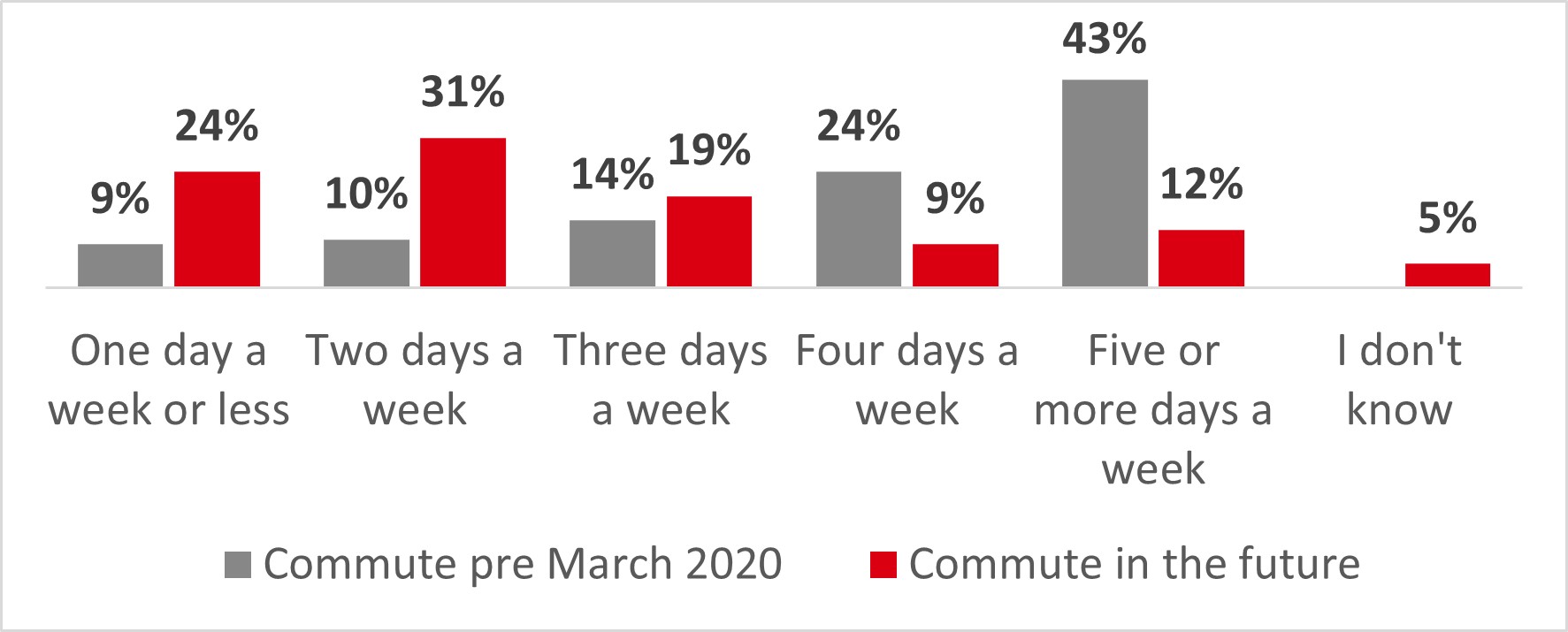Flexi-season tickets – the future for rail commuting?
21 April 2021
Even the snow over the Easter holiday couldn’t dent the sense that spring is here – better weather and better times seem tantalisingly close. As we continue on the respective roadmaps out of lockdown people will increasingly look to get out and about more and thoughts are increasingly turning to what this might mean for public transport.
Will demand for rail and bus return, have attitudes towards public transport changed and what might make people travel more are going to be key questions. Experiences from last year’s ‘relaxation’ might give us some clues. Last autumn when restrictions were loosened we saw through our Covid-19 tracker survey that use of rail and bus for leisure purposes (visiting friends or family, shopping or days out) started to increase while commuting remained flat.
In pre-Covid times commuting was a key market for rail so any change in future demand is of great importance. There has been much written and said about the future of the workplace – will people return to the office or has working from home finally provided an escape from the daily commute. As we begin to emerge from restrictions now seems a good time to publish our own contribution to this debate.
Last November we asked our Transport User Panel about their past and future commuting patterns on rail. The report is available here. We focussed on people who used to be regular commuters by rail but who said they do not have to physically attend their workplace all the time in order to do their job. This was not to ignore those whose jobs mean they do need to travel to work all the time. By focusing on those who may have a degree of choice we got a better sense of whether they plan to continue to work from home in future or get back on the train. Many will have been ‘captive commuters’ of old. Now that they have some discretion what will they choose?
The answer came through loud and clear: people expected to commute less and work from home more. There was a significant drop in those who said they will commute five days a week in future – from 43 per cent pre-pandemic to 12 per cent after. Those saying they will commute four days a week had also dropped, from 24 per cent to 9 per cent. Conversely there was an increase in those saying they will commute from one to three days a week.

Base: those for whom rail was their main mode of commuting pre March 2020, who do not have to physically attend their workplace all the time, and who will commute by rail in the future (875).
Employers also seemed to be comfortable with this shift. Seven out of 10 of those who expect to work from home at least some of the time in future said their employer was supportive of staff working from home. Only five per cent said their employer was unsupportive.
As well as having an impact on timetables, frequency of services and crowding, changing working patterns would also have a big impact on rail ticketing. There was a noticeable shift away from buying annual and monthly season tickets in future. Prior to Covid-19, 35 per cent of our sample told us they used an annual season ticket – just 5 per cent of those expected to do so in the future. For monthly seasons the drop was from 16 per cent to 5 per cent. As might be expected demand for single and return tickets increased.
Perhaps not surprisingly flexible season tickets that were more suited to a hybrid home-office split of working were attractive in our survey. Nearly eight out of ten liked the idea of buying a bundle of tickets (at a discounted rate) that could be used over a month. And just over a third said that it would make them more likely to travel to or from work in the future. Increasing the potential number of journeys made (for instance in making two trips to the workplace rather than one in a week) could potentially also increase overall revenue for the railway.
Does this signal the death knell for season tickets then? Care has to be taken not to take this research out of context – as mentioned we were looking at those people who had some discretion in how they worked in future rather than all workers. But even so, it is clear that working from home is firmly established. Many people have been doing so for over a year now and our research shows they want to continue – it’s not going away. We don’t know when the current work from home advice will change but it is something the railway will have to adapt to. There are interesting times ahead.



